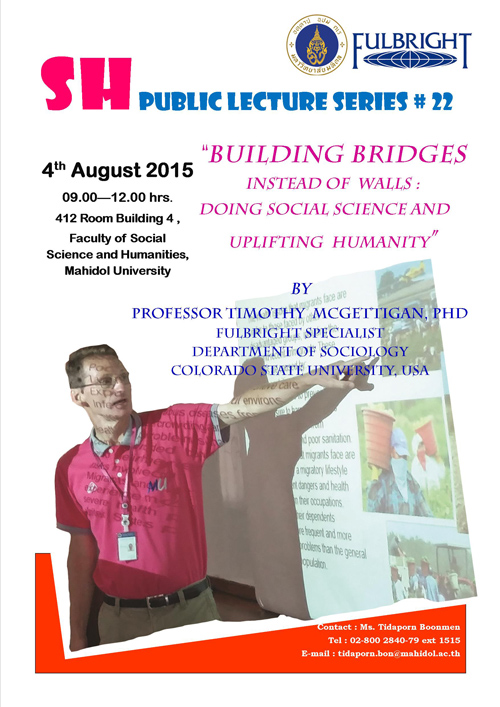Long ago, Thomas Malthus argued that, although humans might be able to outpace nature's carrying capacity in the short-term, in the long run the mathematics of population growth would precipitate disaster. According to Malthus' original predictions, widespread starvation was inevitable due to the fact that food production could only increase arithmetically, whereas population growth was exponential. During Malthus' day, without the advantage of family planning technologies, offspring in typical pre-industrial families could easily outnumber parents by an exponential factor. Consequently, Malthus felt certain that, as populations exploded, demands for food would necessarily exceed available supplies. When that occurred, widespread starvation would ensue with the end result being a catastrophic population crash.
Interestingly, Malthus published his first predictions about overpopulation in the year 1798. At the beginning of the nineteenth century, the global population stood at approximately one billion people. In the years since his prediction, global population has indeed grown exponentially. As of 2012, global population has climbed to over seven billion people. Although it is safe to say that population has mushroomed precisely as Malthus predicted--during the twentieth century alone global population quadrupled from 1.5 billion to 6 billion people--the global food crisis that Malthus predicted has not occurred. Certainly, there have been persistent and tragic food shortages all over the planet, particularly in the developing world. Nevertheless, the calamitous food crisis that Malthus predicted has not yet transpired. Thus, one must wonder: How have humans avoided the Malthusian nightmare?
Seeing the Future through the Past
It turns out that, like many great thinkers, Thomas Malthus attempted to predict the future through the lens of the past. Time is structured such that human experience is always located in the present. In turn, the present can be understood as a dynamic temporal transition point through which time flows toward the future and away from the past. It's as if we are all time-surfers; we skim forward on a temporal foundation that is fixed to the present while time washes by from the future to the past. Given the one-way flow of time, humans have direct experience with two of the three discernible temporal domains: we occupy the present while preserving fragmentary records of the past.
Once again, due to the uni-directional flow of time, the temporal dimension with which humans lack direct experience is the future. Never having inhabited the future, its specific attributes are largely a mystery. The flow of time would need to reverse in order to acquaint time surfers with the same level of insight about the future that we currently accumulate about the present and past. Thus, no one can predict the future because neither the future, nor the fate of humanity is yet determined. At best, we can make educated guesses, based upon extrapolations from the past and present, about how the future might unfold. Still, because of the extraordinary capacity that super-adaptable agents (i.e., humans) have to modify the course of events in utterly unpredictable ways, we will never know precisely what the future holds until it arrives in the present.
Essentially, the future is a process. The fact that the earth has been revolving around the sun for eons is a fairly strong indicator that it will continue doing so in the future. However, as Karl Popper argued, past circumstances, no matter how long they may have persisted, provide no absolute guarantee that similar events will transpire in the future. Though the probability is minuscule, an asteroid just might pulverize the earth tomorrow. Thus, the future is a combination of phenomena that give shape to the present blended with dynamics that stimulate change in the future. As such, the future is a construct that is constantly undergoing a process of evolutionary and unpredictable change. Indeed, one of the most unpredictable instigators of temporal change is the often improbable impact that human agents have upon the structure of unfolding events.
Thomas Malthus gazed into the future through a paradigm that was shaped by eighteenth century expectations. Within the context of the eighteenth century, there was no conceivable means by which to sustain an exponentially-increasing global population. As a result, Malthus was convinced that the end was near. Interestingly, in the late eighteenth century, the world as Malthus knew it was about to end, but, importantly, not in the way that Malthus had predicted. Malthus published his prognostications about the presumptive fate of humanity as the age of agriculture was coming to a close. Being unacquainted with the sweeping social, political, economic, and scientific changes that would accompany the Industrial Revolution, Malthus was unable to foresee the innovations that would amplify food supplies sufficiently to keep pace with exploding populations. Technologies such as higher yield grains, fertilizers, pesticides, herbicides, and petroleum-powered machines have generated astounding increases in agricultural yields throughout the industrial era.
Without doubt, the problems that Malthus identified were real. Just as it would have been impossible for NASA to safely land astronauts on the moon using 1950s space technologies, so too would it have been impossible to avert the Malthusian nightmare using seventeenth century agricultural techniques. Exploding populations represented a dire crisis, and as Karl Popper argued, all life forms must find ways to solve problems or they will perish. In response, super-adaptable humans dealt with the problems associated with population growth and impending food shortages by pursuing an entirely new problematic: industrial society. Having thus dramatically redefined the substance and structure of human society, nineteenth century Europeans set about the process of transforming the social, political, cultural, and technological landscape to make the machine-age a reality.
Mitigating Problems through Progress
In the industrial era, the food supply problems that Malthus foresaw have largely been mitigated. Again, in recent centuries, global population has expanded exponentially, and, in spite of nagging problems associated with an unequal distribution of food, the total supply of food has kept pace. Though Malthus would be surprised by this outcome, Karl Popper would not. Again, Popper argued that humans are extraordinarily adept at developing intellectual solutions to survival problems. In successfully identifying such solutions, old problems often become non-issues: in industrially-advanced nations, farmers have been able to produce more food than consumers can eat. In fact, instead of being plagued by shortages, Americans are increasingly plagued by the problem of overabundance.
The fact that the population quadrupled during the twentieth century is an undeniable indicator of human problem-solving ingenuity. However, as the population has grown, the degree to which humans have taxed the environment has also increased. For example, our love affair with hydrocarbons has had a dramatic impact on global climate, including elevating sea levels, a shrinking cryosphere, expanding deserts, etc. Thus, successful exploitation of fossil fuels has produced entirely new problems.
Frustrating as this situation may seem, Karl Popper would not be troubled by such developments. Popper argued that, in the game of life, successful solutions to one set of problems invariably generate an entirely new set of problems. When Popper argued that all life is problem solving, he literally meant that survival for every living creature is contingent upon developing workable solutions to environmental problems. Living creatures either develop effective strategies to secure the necessary sustenance, space, and security that they require, or they will expire. Most life forms develop new survival strategies through the genetic evolutionary process. Random genetic mutations that enhance a creature's ability to solve environmental problems (e.g., accessing new food sources, dissuading predators, expanding into new territory, etc.) confer advantages in the struggle for survival. However, as creatures successfully adapt, they inevitably encounter new survival challenges to which they must adapt afresh (e.g., marine mammals successfully reconquered the sea only to encounter hungry sharks in their new environment). Thus, evolution is a never-ending process because every creature must constantly re-adapt to changing survival conditions. Humans are subject to the very same survival pressures as other creatures.
Having taken full advantage of hydrocarbon-age technologies, humans are now confronted with an entirely new set of problems: global warming, ozone depletion, unsecured nukes, pollution, depletion of resources, etc. In spite of our success, the problems that plague humanity seem, if anything, larger and more insoluble than ever. Yet, strange as it may seem, that's actually a good thing.
It is certainly true that, if nothing changes, the problems that humanity currently faces will be irresolvable. Just as Malthus gazed at the burgeoning problems in the eighteenth century and concluded that, for citizens of that era, the situation was hopeless, the same will be true for citizens of the twenty-first century. Einstein summed up this situation thus: "The significant problems we face cannot be solved at the same level of thinking we were at when we created them." In other words, we can't possibly hope to solve existing problems with existing knowledge. While that might seem to be a hopelessly pessimistic perspective, it is simply a statement of truth--but it is also a call to action.
As with many prognosticators, Malthus failed to see the future coming. That is, Malthus viewed the future through a paradigm that was better suited to make sense of the past. When Malthus assumed that the future would inevitably be shaped by the same forces that had defined his present, he made a critical error. The problems that plague one historical era, so long as humans succeed in elevating their thinking, often tend to be viewed as relatively minor challenges in succeeding eras.
This is not to say that the advancement of scientific knowledge will gradually create a perfect world. Far from it. In agreement with Popper, I believe that the problem-solving process is never-ending. Each solution to a major survival problem will always introduce an entirely new set of even more challenging problems. Though we will never live in a trouble-free world, we can feel safe in the knowledge that, so long as we have the courage to dream of doing the impossible, no problem will ever be too challenging to overcome.
(Interested in more of this dicussion? Check out
Good Science.)






